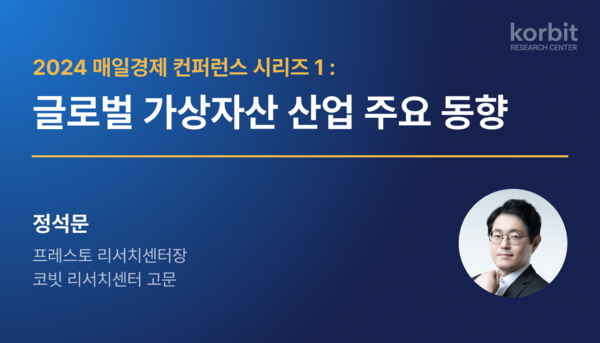
Korbit Research Center, a subsidiary of virtual asset exchange Korbit, announced on the 19th that it has published a report summarizing the main contents of the '2024 Maeil Business Newspaper Virtual Asset Conference'.
In the first series, the Korbit Research Center summarized the topic of 'Key Trends in Global Virtual Asset Business' presented by Presto Jeong Seok-moon, Head of Research Center and Advisor at Korbit Research Center, into three main points: △Institutionalization of Virtual Assets, △Cases of Overseas Institutionalization Promotion, and △Future Tasks for Korea.
Advisor Jeong divided the institutionalization process of the virtual asset industry into 'three growth stages' and explained them. The first growth stage (2009-2019) was called 'retail laboratory', the second growth stage (2020-2022) was called 'transitional stage', and the third growth stage (2023-present) was called 'establishment of institutionalization trajectory' and explained them.
The main reasons for institutionalization include changes in the perception of the social leaders, macroeconomic factors, the Lindy effect, and reduced regulatory risk. Citing US case law, he emphasized that virtual assets are not securities.
In the middle of the presentation, Hong Kong’s virtual asset promotion policy was mentioned as an example of overseas institutionalization. Hong Kong, one of the countries leading the institutionalization trend, is revising existing laws and creating an environment where virtual assets can be handled within the institutional system in order to establish itself as a virtual asset hub.
The Korbit Research Center cited Hong Kong’s approach as an example, adding that a consistent government stance toward accepting virtual assets as part of a new financial system is important. The presenter emphasized the need for capital regulation relaxation in Korea. He stated that blockchain technology can be most effectively utilized in countries that guarantee free capital flow.
“Institutionalization of virtual assets and active financial innovation can only take place when free capital flow is possible,” said Yoonyoung Choi, head of Korbit’s research center. “We must keep in mind that if we do not improve existing legal barriers such as foreign exchange market regulations, we may lose competitiveness in the market.”








